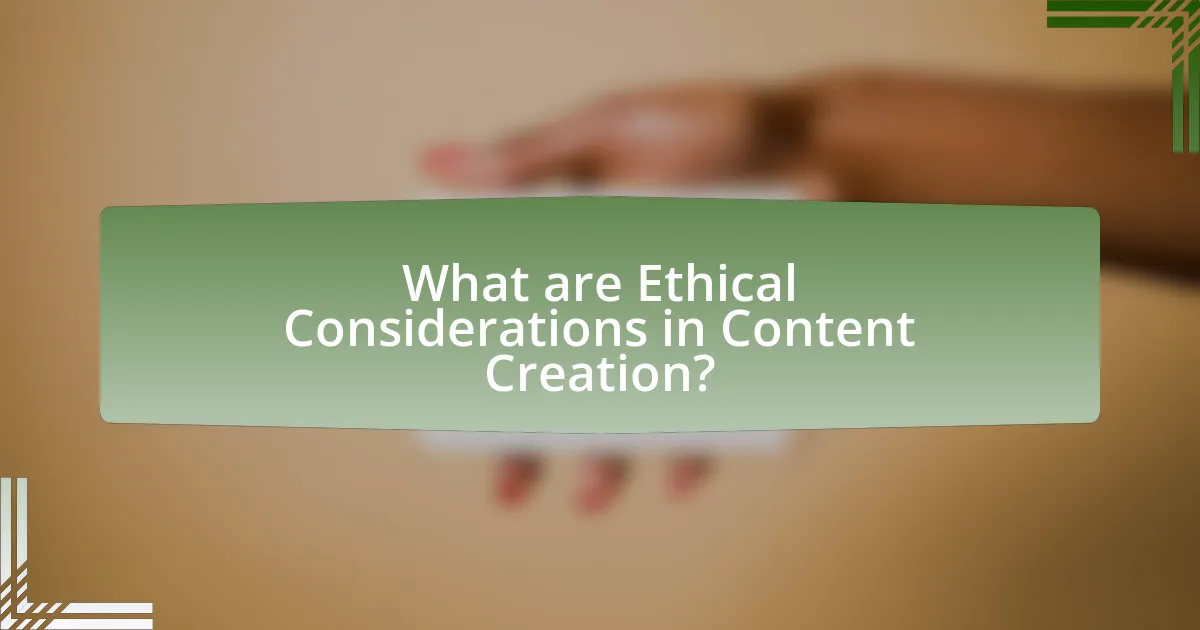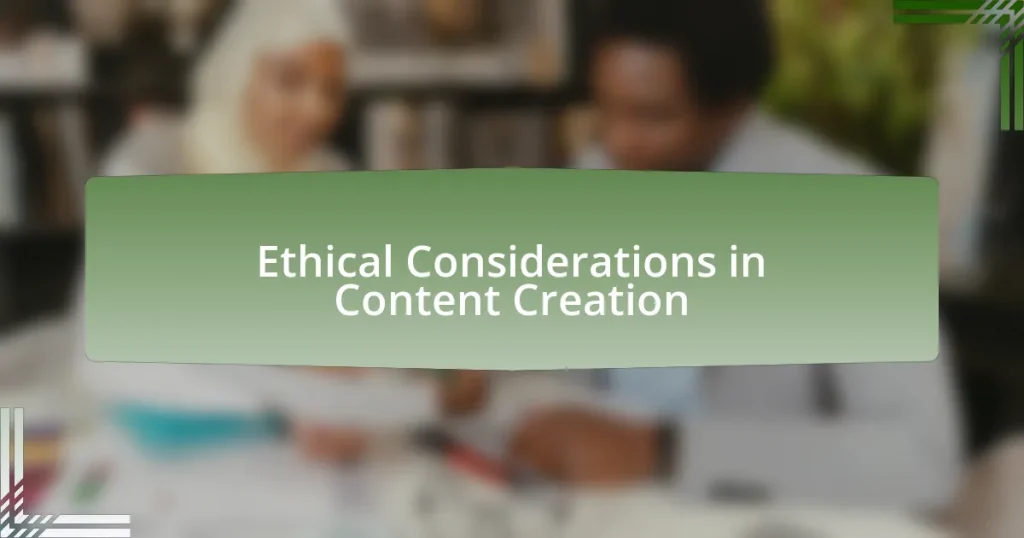Ethical considerations in content creation encompass principles that guide the responsible production and dissemination of information, including honesty, transparency, respect for intellectual property, and the avoidance of harm. These principles are crucial for maintaining the integrity, credibility, and trustworthiness of content, as they help prevent misinformation and exploitation. The article explores the importance of ethical practices, the potential consequences of ignoring them, and the impact on audience trust. It also discusses key ethical principles, challenges faced by creators, and strategies for ensuring ethical content creation, emphasizing the need for a personal code of ethics and adherence to legal standards.

What are Ethical Considerations in Content Creation?
Ethical considerations in content creation involve principles that guide the responsible production and dissemination of information. These principles include honesty, transparency, respect for intellectual property, and the avoidance of harm. For instance, creators must ensure that their content does not mislead audiences, which is supported by the Society of Professional Journalists’ Code of Ethics emphasizing accuracy and fairness. Additionally, respecting copyright laws is crucial, as failure to do so can lead to legal repercussions and undermine the integrity of the creator. Furthermore, content creators should consider the potential impact of their work on various audiences, ensuring that it does not perpetuate stereotypes or misinformation.
Why are ethical considerations important in content creation?
Ethical considerations are important in content creation because they ensure the integrity, credibility, and trustworthiness of the content produced. Adhering to ethical standards helps prevent misinformation, plagiarism, and exploitation of vulnerable groups, which can lead to significant harm and loss of public trust. For instance, a study by the Pew Research Center found that 64% of Americans believe that fabricated news stories cause confusion about basic facts, highlighting the critical need for ethical practices in content creation to maintain societal trust and informed discourse.
What potential consequences arise from ignoring ethical considerations?
Ignoring ethical considerations can lead to significant negative consequences, including loss of credibility, legal repercussions, and harm to individuals or communities. When content creators disregard ethics, they risk spreading misinformation, which can damage their reputation and trustworthiness. For instance, a study by the Pew Research Center found that 64% of Americans believe that fabricated news stories cause confusion about basic facts, illustrating the impact of unethical content on public perception. Additionally, failing to adhere to ethical standards can result in legal actions, such as lawsuits for defamation or copyright infringement. Furthermore, unethical practices can perpetuate stereotypes or cause psychological harm, as seen in cases where media representation has led to societal stigmatization. These consequences highlight the importance of ethical considerations in content creation.
How do ethical considerations impact audience trust?
Ethical considerations significantly impact audience trust by establishing credibility and fostering transparency. When content creators adhere to ethical standards, such as honesty, integrity, and respect for the audience, they build a foundation of trust. Research indicates that 81% of consumers need to trust a brand before making a purchase, highlighting the importance of ethical practices in content creation. Furthermore, ethical lapses, such as misinformation or exploitation, can lead to a rapid decline in audience trust, as seen in various cases where brands faced backlash for unethical behavior. Thus, ethical considerations are crucial in maintaining and enhancing audience trust.
What are the key ethical principles in content creation?
The key ethical principles in content creation include honesty, integrity, respect for intellectual property, and accountability. Honesty requires creators to present information accurately and transparently, avoiding misleading claims. Integrity involves maintaining consistency in values and ethical standards throughout the content. Respect for intellectual property mandates that creators acknowledge and credit original sources, preventing plagiarism. Accountability holds creators responsible for the impact of their content, ensuring that it does not harm individuals or communities. These principles are essential for fostering trust and credibility in the content creation process.
How does honesty play a role in ethical content creation?
Honesty is fundamental to ethical content creation as it fosters trust between creators and their audience. When content creators present accurate information and disclose potential biases, they uphold integrity, which is essential for maintaining credibility. Research indicates that 81% of consumers need to trust a brand before making a purchase, highlighting the importance of honesty in building relationships. Furthermore, ethical guidelines in journalism and content creation emphasize transparency and accountability, reinforcing that honesty is not just a moral choice but a necessary practice for responsible communication.
What is the significance of transparency in content creation?
Transparency in content creation is significant because it builds trust between creators and their audience. When content creators disclose their sources, intentions, and potential biases, they foster an environment of credibility and accountability. Research indicates that 86% of consumers consider transparency important when deciding which brands to trust, according to a 2020 study by Label Insight. This trust can lead to increased engagement, loyalty, and a positive reputation for the creator. Furthermore, transparency helps to combat misinformation, as audiences are better equipped to evaluate the reliability of the content they consume.
How do cultural differences influence ethical considerations in content creation?
Cultural differences significantly influence ethical considerations in content creation by shaping perceptions of appropriateness, respect, and representation. For instance, what is deemed acceptable in one culture may be offensive in another, leading to potential backlash or misinterpretation. Research indicates that content creators must be aware of cultural norms and values to avoid perpetuating stereotypes or causing harm. A study by Hofstede Insights highlights how cultural dimensions, such as individualism versus collectivism, affect communication styles and ethical standards across different societies. Therefore, understanding these cultural nuances is essential for ethical content creation that resonates positively with diverse audiences.
What challenges arise when creating content for diverse audiences?
Creating content for diverse audiences presents challenges such as cultural sensitivity, language barriers, and varying preferences. Cultural sensitivity is crucial, as content that resonates with one group may offend another; for instance, humor or references that are culturally specific can lead to misunderstandings. Language barriers complicate communication, requiring content creators to consider translation and localization to ensure clarity and accessibility. Additionally, varying preferences in content consumption, such as format and style, necessitate a nuanced approach to engage different demographics effectively. These challenges highlight the need for thorough research and understanding of the target audience to create inclusive and effective content.
How can content creators respect cultural sensitivities?
Content creators can respect cultural sensitivities by conducting thorough research on the cultures they represent and engaging with members of those communities. This approach ensures that creators understand cultural norms, values, and potential taboos, which helps avoid misrepresentation or offense. For instance, a study by the Pew Research Center found that 70% of individuals from diverse backgrounds appreciate when creators accurately portray their culture, highlighting the importance of authenticity. Additionally, seeking feedback from cultural representatives during the content creation process can further enhance sensitivity and accuracy, fostering a respectful dialogue and promoting inclusivity.
What are the legal implications of ethical considerations in content creation?
The legal implications of ethical considerations in content creation include potential liability for defamation, copyright infringement, and violations of privacy rights. Content creators must ensure that their work does not misrepresent individuals or entities, as this can lead to lawsuits for defamation. Additionally, using copyrighted material without permission can result in legal action from the original creators, as established by the Copyright Act of 1976 in the United States. Furthermore, ethical considerations around privacy require content creators to obtain consent when using personal information or images, as mandated by laws such as the General Data Protection Regulation (GDPR) in Europe. These legal frameworks underscore the importance of adhering to ethical standards to mitigate risks associated with content creation.
How do copyright laws affect ethical content creation?
Copyright laws significantly influence ethical content creation by establishing legal boundaries that protect original works and promote fair use. These laws ensure that creators receive recognition and compensation for their intellectual property, which encourages innovation and creativity. For instance, the U.S. Copyright Act of 1976 grants authors exclusive rights to their works, thereby deterring plagiarism and unauthorized use. This legal framework compels content creators to respect the rights of others, fostering an ethical environment where original ideas are valued and protected. Consequently, adherence to copyright laws not only safeguards creators but also cultivates a culture of respect and integrity within the content creation community.
What role does plagiarism play in ethical considerations?
Plagiarism plays a critical role in ethical considerations by undermining the integrity of original work and violating the principles of honesty and respect for intellectual property. When individuals present someone else’s ideas or expressions as their own, they not only deceive their audience but also diminish the value of authentic contributions in their field. Research indicates that 70% of students admit to cheating at least once, highlighting the prevalence of plagiarism and its ethical implications in educational settings. This behavior can lead to severe consequences, including academic penalties and damage to one’s professional reputation, reinforcing the necessity for ethical standards in content creation.
How can content creators ensure ethical practices in their work?
Content creators can ensure ethical practices in their work by adhering to transparency, respecting copyright, and prioritizing accuracy. Transparency involves clearly disclosing sponsorships and partnerships, which builds trust with the audience. Respecting copyright means obtaining proper permissions for using others’ work, thereby avoiding legal issues and promoting fair use. Prioritizing accuracy requires fact-checking information before publication to prevent the spread of misinformation, which is crucial in maintaining credibility. These practices are supported by guidelines from organizations like the American Society of Journalists and Authors, which emphasize ethical standards in content creation.
What strategies can be implemented to promote ethical content creation?
To promote ethical content creation, organizations can implement strategies such as establishing clear ethical guidelines, providing training on ethical standards, and fostering a culture of accountability. Clear ethical guidelines help content creators understand the expectations regarding honesty, integrity, and respect for intellectual property. Training programs can enhance awareness of ethical issues, such as plagiarism and misinformation, ensuring that creators are equipped to make informed decisions. Additionally, fostering a culture of accountability encourages creators to take responsibility for their work and its impact on audiences, which can lead to more conscientious content production. These strategies are supported by research indicating that organizations with strong ethical frameworks experience higher levels of trust and engagement from their audiences.
How can feedback and collaboration enhance ethical practices?
Feedback and collaboration enhance ethical practices by fostering open communication and diverse perspectives, which lead to more informed decision-making. When individuals engage in feedback loops, they can identify potential ethical issues early, allowing for timely adjustments. Collaboration brings together varied viewpoints, which can challenge biases and promote a more comprehensive understanding of ethical implications. Research indicates that organizations with strong feedback mechanisms and collaborative cultures report higher ethical standards and employee satisfaction, as seen in studies by the Ethics & Compliance Initiative, which found that organizations with effective feedback systems are 30% more likely to uphold ethical practices.
What are common ethical dilemmas faced by content creators?
Content creators commonly face ethical dilemmas such as copyright infringement, misinformation, and the impact of sponsored content on audience trust. Copyright infringement occurs when creators use copyrighted material without permission, risking legal consequences and undermining the rights of original creators. Misinformation arises when creators share inaccurate or misleading information, which can harm public perception and trust. Additionally, the integration of sponsored content can lead to conflicts of interest, as creators must balance transparency with the desire for financial gain, potentially eroding audience trust if not disclosed properly. These dilemmas highlight the need for ethical standards in content creation to maintain integrity and accountability.
How should content creators handle conflicts of interest?
Content creators should disclose any conflicts of interest transparently to maintain trust and credibility with their audience. This involves openly communicating any financial, personal, or professional relationships that could influence their content. For instance, if a creator is sponsored by a brand, they must clearly indicate this sponsorship in their content, as mandated by the Federal Trade Commission (FTC) guidelines. These guidelines emphasize that transparency helps audiences make informed decisions and fosters ethical standards in content creation.
What steps can be taken to address misinformation in content creation?
To address misinformation in content creation, content creators should implement fact-checking protocols, utilize credible sources, and promote transparency in their work. Fact-checking protocols involve verifying information before publication, which can significantly reduce the spread of false claims. Utilizing credible sources, such as peer-reviewed journals or reputable news outlets, ensures that the information presented is accurate and reliable. Promoting transparency includes disclosing sources and methodologies, allowing audiences to assess the credibility of the content. Research indicates that misinformation can be effectively mitigated through these practices, as demonstrated by studies showing that fact-checked information is more likely to be trusted by audiences.
What best practices can guide ethical content creation?
Best practices that can guide ethical content creation include ensuring accuracy, respecting copyright, and prioritizing transparency. Accuracy is crucial as it builds trust with the audience; for instance, a study by the Pew Research Center found that 64% of Americans believe that misinformation is a major problem in society. Respecting copyright involves giving proper credit to original creators, which is essential to uphold intellectual property rights and avoid legal issues. Transparency in disclosing sponsorships or conflicts of interest fosters honesty and accountability, as highlighted by the Federal Trade Commission’s guidelines on endorsements and testimonials. These practices collectively contribute to ethical standards in content creation.
How can content creators develop a personal code of ethics?
Content creators can develop a personal code of ethics by identifying their core values and principles that guide their work. This process involves reflecting on what is important to them, such as honesty, transparency, and respect for their audience. By establishing these values, creators can create guidelines for their content that align with their ethical beliefs.
Additionally, they should consider the impact of their content on their audience and society, ensuring that their work promotes positive messages and avoids harm. Engaging with existing ethical frameworks in their field, such as the Society of Professional Journalists’ Code of Ethics, can provide a solid foundation for their personal code.
Finally, regularly revisiting and revising their code in response to new challenges and feedback will help maintain its relevance and effectiveness.
What resources are available for learning about ethical content creation?
Resources for learning about ethical content creation include online courses, books, and industry guidelines. Online platforms like Coursera and edX offer courses on digital ethics and responsible content creation, often developed by universities and industry experts. Books such as “Ethics in Content Creation” by David B. Smith provide in-depth discussions on ethical practices. Additionally, organizations like the Content Marketing Institute and the American Marketing Association publish guidelines and articles that address ethical standards in content creation. These resources collectively provide a comprehensive foundation for understanding and implementing ethical practices in content creation.
How can content creators balance creativity and ethics?
Content creators can balance creativity and ethics by establishing clear guidelines that prioritize integrity while allowing for innovative expression. This involves adhering to ethical standards such as honesty, respect for intellectual property, and sensitivity to diverse audiences. For instance, the American Psychological Association emphasizes the importance of ethical practices in research and publication, which can be applied to content creation by ensuring that creators do not misrepresent facts or exploit vulnerable groups. By integrating ethical considerations into the creative process, content creators can produce work that is both imaginative and socially responsible.
What techniques can help maintain ethical standards while being innovative?
Techniques that can help maintain ethical standards while being innovative include implementing a robust ethical framework, fostering transparency, and engaging in stakeholder dialogue. Establishing an ethical framework provides clear guidelines for decision-making, ensuring that innovation aligns with moral principles. Transparency in processes and outcomes builds trust and accountability, allowing stakeholders to understand the implications of innovative practices. Engaging in dialogue with stakeholders, including consumers and community members, ensures that diverse perspectives are considered, which can lead to more ethically sound innovations. Research indicates that organizations that prioritize ethical considerations in their innovation processes tend to achieve long-term success and positive public perception, as seen in studies by the Harvard Business Review.
How can ethical considerations enhance the quality of content?
Ethical considerations enhance the quality of content by ensuring accuracy, integrity, and respect for diverse perspectives. When content creators adhere to ethical standards, they build trust with their audience, which leads to higher engagement and credibility. For instance, research by the Pew Research Center indicates that 67% of Americans believe that ethical journalism is crucial for a well-informed public. This trust fosters a loyal audience base, ultimately improving the overall quality and impact of the content produced.




